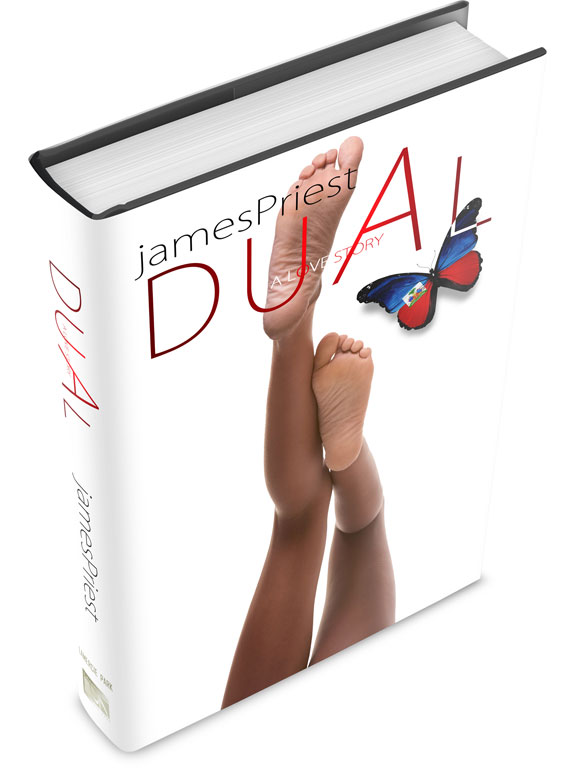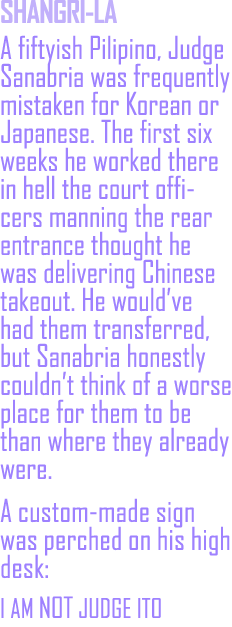
I wrote this novel in five days.
Actually, I wrote a much longer novel in five days, but trimmed
about a third of it in subsequent rewrites. Then I stuck it in a
drawer for twenty years. There were many reasons for that,
abject laziness being not the least of them. I did shop the book
a little, but the manuscript was rejected as unpublishable
because it is, essentially, a murder mystery narrated by the
victim. Iím not sure why some editors found that narrative
device to be so objectionable, but I liked my little story and
was unwilling to change it, so back in the drawer it went.
Now, with the advent of self-publishing, I am discovering
avenues for all manner of things my agent could not; work for
which I have a fondness regardless of its commercial value. If
youíre reading this, or even just previewing it online, Iíd like
to thank you for your interest in the uninteresting; in work
professionals have assured me has absolutely no value.
A major plot error: at the time I wrote this, Iíd assumed
Roosevelt Island was part of Queens, which it is not. Roosevelt
Island is actually part of Manhattan and, thus, the Queens
County prosecutor would not be handling the murder case.
Roosevelt Island is owned by the city, but was leased to the
state of New Yorkís Urban Development Corporation in 1969 for
99 years. The NYPD would not be investigating the Quentin
Blacque murder at all; that case would have been handled by the
Roosevelt Island Department of Public Safety or RIPS, who would
likely have referred it to the New York State Police. I may
someday perform the extensive rewriting necessary to correct
this inaccuracy, but I doubt it.
I should mention, to my Christian friends, that this work was
written long before I made any formal commitment to ministry,
hence all the cussing and sexual content. Prepping for
publication in 2015, I struggled with issues of artistic
integrity impacting personal testimony and, in the end, chose to
preserve the artistic expression as originally intended rather
than have it reflect who I am now or speak for me, something
this little pop story was never intended to do.
I've published it under the name "James Priest" to avoid further
confusion with the British novelist Christopher Priest, whom I
am quite certain has been driven insane from typing, "No, I
don't write Black Panther" thousands of times.
Dead Man's Tale
A murder mystery narrated by the victim, Dual: A Love Story
concerns Gerry Martinez, a New York City police detective
assigned to the Queens County Prosecutorís Office, who is
investigating the murder of a New York photographer, committed
presumably by his wife. Complicating matters, the wife has a
twin, a virtual clone down to her DNA, and the prosecutionís
challenge is to definitively prove which of the exotically
beautiful twins committed the murder. Gerry finds himself drawn
into a deepening mystery involving a large, politically
connected family hiding a closely-held secret they are all
willing to lie and, possibly, kill to protect. Gerry runs afoul
of the U.S. State Department and incurs the wrath of a
mysterious death squad who come gunning for him as he begins to
unravel the mystery the family is so determined to hide. In the
midst of it all, Gerry finds himself inescapably drawn first to
one of the twins, then the other; discovering that, to fall in
love with one is to fall in love with them both. And, falling in
love with them both can get you killed.
Themes: the meaning of family, the relevance of love, romantic
police/crime drama. 92,000 words / 28 Chapters / 300 pages.
Recommended for mature readers. Includes explicit language and
sexual content.
This novel was inspired by the late Elmore Leonardís eclectic
humanism; a kind of gathering of imbeciles from which
description the antihero himself is not excluded. As with my
previous work, Zion, we again visit the theme of loveólove as
part of the supporting castóand the myriad ways this particular
form of insanity can derail lives or, in this specific case,
entire countries. I am not, in any way, counting Mr. Leonard as
any sort of peer; I am, after all, just a comic book guy
stirring a toe in the pool of novelists. Iím just saying
Leonardís work is amazing fun and it is the voice I am, in my
own way, echoing by this (literal) dead manís tale.
I wrote Dual before the devastating 2010 earthquake in Haiti. It
is set in the year 1994, which was roughly the time period in
which the book was written, mainly because Iím too lazy to do a
complete rewrite with respect to what Haiti is now: a deeply
troubled nation beset by unimagined horrors. The best way to
demonstrate the horror that country continues, to this day, to
experience is not to show endless images of shrieking,
hysterical people and piles of dead bodies. The mediaís gory and
often gratuitous exploitation really doesnít tell the story.
Donít show the death there, show the life there, and why that
life has worth and value.
Americaís troubled history with Haiti seems mostly about its
proximity. I mean, we seem perfectly content to ignore the
unfathomable ongoing rape, torture and massacre in Darfur,
numbers which dwarf the horror in Haiti. But, in 2010, we were
in Haiti Overload, holding rallies and candlelight vigils and
bake sales. Whereís our bake sale for Darfur? For the Congo?
And, how long will our compassion last?
Five years after the disaster, Haiti is barely mentioned.
Billions in aid have become ensnared in bureaucratic posturing,
never reaching those who need it most. Millions still live in
flimsy tent cities with poor sanitation, suffering rampant
disease, crime, and rape at-will, performed in many cases by the
very men hired to protect the homeless.
The disaster in Haiti is far from over; it is still very much a
disaster, exacerbated all the more by illiteracy which breeds
the kind of hateful ignorance that seeds the kind of rampant
corruption that has greedy men and women lining their pockets,
growing fat off of foreign aid, while allowing precious little
of that resource to reach the poor.
America has become indefatigably petulant, demanding quick
solutions to challenges which require both our resolve and our
determination. Nation building, as we have practiced it to the
extent of an incomprehensible national deficit, takes not only
years but generations to achieve real change. America has little
motivation to invest in Haiti, the western region of the Island
of Hispaniola, which presents no strategic or economic value for
us.
We are instant gratification junkies: how long will weócan
weótune in for the Misery In Haiti report? How long before we
turn on the Haitians, blaming them for their own earthquake and
for not having instantly built brand-new homes for their
displaced millions? We are conditioned to expect this plotline
to be wrapped up by the last commercial break; our patience is
virtually nonexistent.
The difference between a short-lived Haiti Fad (2010) and the
beginning of a new understanding and new hope for that
beleaguered nation rests completely in our determination to
invest ourselves. Five years later, Iíve yet to see much
evidence we are prepared to do that.
I certainly encourage us all to pray; pray for these wonderful,
warm, friendly, loving, lyrical, mysterious, almost magical
people I have grown to know and love and be loved by. Beyond
that, Iíd encourage us all to give of ourselves, give of our
spirit: take interest, ask questions, raise our voices. Preach
but, even better, teach, for enlightenment is the only true
remedy for ignorance; and ignorance is both self-replicating and
self-financing.
The Kindle version is on sale for only $4.95
and can be downloaded
here,
and you don't need to own a Kindle (or even a tablet) to read
it. If you grab it, please do me a solid and post a
comment on Amazon, let me know what you think.
Jenkins-Penn Haitian
Relief Organization
Clinton-Bush Haiti Fund
International Red Cross Haiti Assistance Program
Christopher J. Priest
2 February 2015
Home | Blog | Projects | Comics | Rants | Music | Video | Christian Site | Contact
Unless otherwise specified, text Copyright © 2015 Lamercie Park. All Rights Reserved.
TOP OF PAGE






